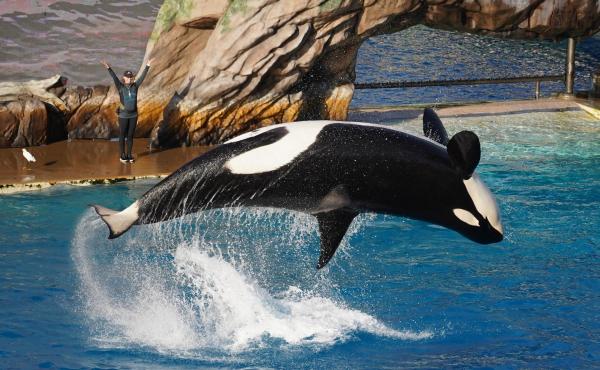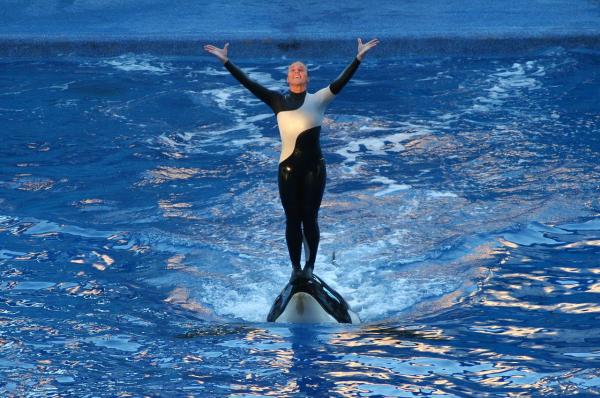Are Killer Whales Dangerous to Humans?


The subject of whether orcas, commonly known as killer whales, are dangerous has become a topic of intense debate and curiosity in recent years. With their imposing size, power, and reputation as apex predators, orcas have long fascinated and captivated humans. Their exceptional intelligence, intricate social structures, and remarkable hunting abilities position them as some of the most formidable predators in the animal kingdom.
In this article from thedailyECO, we delve into the question of whether orcas pose a threat to humans. In exploring their behaviors, feeding patterns, and interactions with humans, we seek to unravel the complexity surrounding these magnificent creatures.
Are orcas dangerous to humans?
Orcas are called "killer whales" due to a historical misinterpretation of their behavior and their association with powerful marine predators. The name "killer whale" originated from the term "whale killer" used by ancient sailors who observed orcas hunting and preying on other whale species. However, over time, the name got reversed and became "killer whale."
The label "killer whale" can be misleading because it implies that these animals are inherently dangerous or aggressive towards humans. In reality, orcas are highly intelligent, social creatures that typically pose no threat to humans in the wild.
As carnivorous marine mammals, killer whales prey on a wide range of sea creatures. Their size, swimming ability, teeth, and intelligence make them highly efficient predators. Killer whales possess various traits and techniques that contribute to their hunting prowess, making them one of the most formidable predators in the sea. Their large size, impressive swimming speed, sharp teeth, and intelligent strategies allow them to efficiently incapacitate their prey.
Orcas possess a remarkable level of intelligence, boasting one of the largest and most complex brains among all mammal species. This fact underscores the importance of acknowledging the intricate nature of the animal kingdom. As humans, we often resort to oversimplification by categorizing creatures as either dangerous or non-dangerous. However, the reality is far more nuanced.
In the vast majority of cases, orcas and humans can coexist peacefully, and interactions with these remarkable creatures are often characterized by curiosity and mutual respect.
Do orcas eat humans?
Humans are not part of a killer whale's natural diet, and therefore, they are not typically dangerous to humans. While killer whales are predatory creatures, they do not consume or actively attack humans.
There have been no confirmed reports of wild orcas preying on or consuming humans in their natural habitat. Orcas are primarily known to feed on a variety of marine mammals, fish, and squid.
While orcas are powerful predators and possess sharp teeth, they do not typically consider humans as prey. Cases of orcas showing aggression towards humans in the wild are exceptionally rare and usually involve specific circumstances such as captivity, interactions with injured or distressed animals, or mistaken identity.
Be sure to read this other article, where we provide comprehensive information about Monodontidae. Similar to orcas, both species within this family are highly intelligent and renowned for their complex social interactions.
Are captive orcas dangerous?
Captive orcas, like any wild animal, can potentially pose risks and may exhibit behaviors that can be perceived as dangerous. It is important to recognize that orcas are highly intelligent, powerful, and complex creatures that have specific physical and social needs.
In captivity, orcas are often kept in tanks or enclosures that are significantly smaller than their natural habitat. This confinement can lead to physical and psychological distress, which may result in abnormal behaviors and increased stress levels. In some cases, these conditions can potentially contribute to aggressive or unpredictable behavior.
While incidents involving captive orcas injuring or causing harm to humans have occurred, they are relatively rare compared to the vast number of orcas held in captivity. It's worth noting that the majority of documented interactions between captive orcas and humans have not involved aggression.
Nevertheless, due to their size, strength, and complex social dynamics, it is essential to approach captive orcas with caution and adhere to strict safety protocols when working or interacting with them.
It is worth mentioning that the topic of keeping orcas in captivity is a subject of ongoing debate and ethical concerns. Many organizations and experts advocate for the end of captive orca displays, emphasizing the importance of promoting conservation, research, and education in natural environments instead.

Orca attacks on humans
There have been instances of orca attacks on humans, but it is important to examine the underlying causes that are often overshadowed by sensationalized news portraying orcas as inherently violent animals. Let's explore some examples of these incidents.
Tilikum
Tilikum was a captive orca that gained significant attention due to his involvement in several incidents, including the death of his trainer, and his overall behavior in captivity.
The most widely publicized incident occurred in 2010 when Tilikum killed his trainer, Dawn Brancheau, during a live show at SeaWorld. This tragic event raised questions about the safety of trainers working closely with orcas and sparked a broader conversation about the ethical implications of keeping these highly intelligent and social animals in captivity.
Tilikum's aggressive behavior was attributed to various factors, including the stress of captivity, the social dynamics within the confined environment, and his traumatic experiences. As a male orca living with two dominant females in a limited space, he faced continuous aggression from the other whales, which likely contributed to his heightened stress levels and behavioral issues.
Tilikum passed away in January 2017, after spending more than three decades in captivity. His story continues to be a prominent symbol in the ongoing debate about the ethics of marine mammal captivity and the well-being of orcas in particular.
Gladys
Gladys the killer whale is not a single individual; there are actually 15 of them. However, it is the one known as white Gladys that has gained recent internet fame, sparking numerous memes and posts. White Gladys, the oldest and sole adult in the group, has been involved in incidents causing damage and even sinking yachts off the Spanish coast, capturing significant attention from scientists and the public alike.
Since 2020, over 50 attacks by orcas on boats have been documented in the Strait of Gibraltar. Scientists are investigating the causes behind this behavior, which is predominantly exhibited by the Iberian orca. A total of 744 encounters have been recorded, with 19.9% of cases resulting in damage to the vessels.
The Iberian orca is classified as "vulnerable" by Spanish authorities and "critically endangered" according to the IUCN. Its population is very small, with a total of 35 individuals identified by the biologists of the Atlantic Orca Working Group, along with another 14 transient individuals in the region, adding up to less than 50 individuals in total.
Although there is no consensus on the reasons behind the attacks by orcas, several hypotheses are proposed. One of them is that some orcas, like Gladys, may have had a previous negative experience with boats, triggering an aversive behavior to avoid repeating that situation. Another possibility is that they are exhibiting self-induced behavior, where they have learned a new "game" through trial and error and repeat it on multiple occasions.
Be sure to read this other article, where we clarify the differences between the false killer whale and the orca.

If you want to read similar articles to Are Killer Whales Dangerous to Humans?, we recommend you visit our Facts about animals category.
- Marino, L., Rose, NA, Visser, IN, Rally, H., Ferdowsian, H., & Slootsky, V. (2020). The harmful effects of captivity and chronic stress on the well-being of killer whales (Orcinus orca ). Journal of Veterinary Behavior, 35 , 69-82.
- Guerrero, L. (2023) This is Gladys, the orca leader of a gang that attacks and sinks ships in Gibraltar . The Republic. Available at: https://larepublica.pe/mundo/2023/05/30/espana-esta-es-gladys-la-orca-lider-de-una-pandilla-que-ataca-y-hunde-barcos-en -gibraltar-orca-gladys-portugal-moby-dick-311880
- Wiles, G. (2004) Washington State Status Report for the Killer Whale . Washington Department of Fish and Wildlife.







